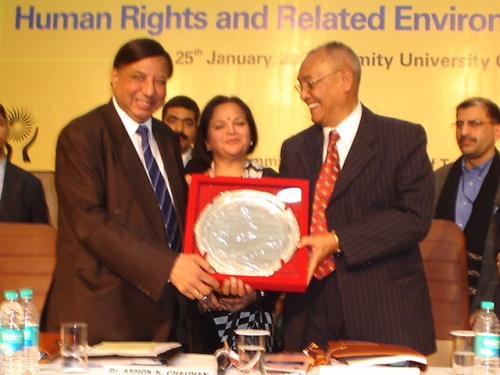24 Jan 2007-25 Jan 2007|Noida | Amity University Campus, Sector-125, Noida
Two day National Seminar on Human Rights and Related Environmental issues inaugurated by Union Minister Mr. P.R. Kyndiah at Amity
 Two day National Seminar on “Human Rights and Related Environmental Issues” organized by Amity School of Natural Resources & Sustainable Development (ASNRSD) in collaboration with National Human Rights Commission (NHRC) and Ministry of Tribal Affairs at Amity University Campus, Noida
Two day National Seminar on “Human Rights and Related Environmental Issues” organized by Amity School of Natural Resources & Sustainable Development (ASNRSD) in collaboration with National Human Rights Commission (NHRC) and Ministry of Tribal Affairs at Amity University Campus, Noida was inaugurated today. The Seminar aims to devise suitable procedural rights for exercise of human beings which while giving a degree of anthropocentricity are capable of giving the pragmatic incorporation of interest of non-human into the legal process.
Inaugurating the seminar,
the Chief Guest Mr. P.R Kyndiah, Hon’ble Union Minister for Tribal Affairs said that there is a fine synergy between human rights and environment, which cannot be overlooked. Any danger to the environmental degradation has the enormous potential to infringe upon and affect Human rights. The cases of air pollution, water pollution etc. are serious environmental issues imbued with hazards to human rights. But, sometimes important human rights are put at stake in the name of preserving environment. Citing the tribal community in the North Eastern Region he further said that Conservation activists have been clamoring to save biodiversity by evicting forest dwelling Scheduled Tribes and other traditional forest dwellers from their native places. But the passing of long awaited Recognition of Forest Rights Bill, 2006 vests the forest rights and occupation related to forest land, in forest dwelling Scheduled Tribes and other traditional forest dwellers, thereby providing them relief against the physical and psychological alienation of land belonging to them.
Speaking on the occasion,
Hon’ble Justice J. S Verma- Former Chief Justice of India & Former Chairman, National Human Rights Commission(NHRC) quoted, “human rights is the matter of heart and heart of the matter.” The two biggest issues of concern, at present, in this rapidly growing nation are Global Warming and Human Suffering. India needs sustainable development of resources for its holistic growth and development.
Addressing the audience
Shri P.C Sharma, IPS (Retd.) – Hon’ble Member, National Human Rights Commission (NHRC) and Guest of Honor on the occasion said that, on one hand, India is talking about Globalization, building strategic relations with other neighboring countries and, on the other hand, poor people are deprived of their right to survive and earn their livelihood. Despite the booming economy, the development graph of Scheduled tribes is still not showing spectacular growth. From the time immemorial these people have been helping in various forest related operations by carrying out most difficult tasks in remote areas but still they lie in shambles. “The need of the hour is to generate awareness about the lamentable plight of our remote brethren and to sensitize conservation activists on the role of these people in the conservation of environment.” said Mr. Sharma
Outlining the importance of the seminar,
Dr. Ashok K. Chauhan, Founder President, R.B.E.F said that this seminar is going to be a milestone in creating awareness about the ongoing tussle between the conservation activists and human rights activists. This concern has become internationalized now. Even International community has assumed the commitment to observe the realization of human rights and respect for the environment. The human rights of the local people in the conservation area cannot be overlooked and so do the need to conserve natural resources which are depleting. A mid way needs to be evolved keeping in view both the interests.
The Chief Guest, Mr. P.R. Kyndiah applauded the initiative taken by Amity University in organizing this seminar of contemporary importance. He further encouraged Amity to take a lead in establishing centers devoted to the studies of tribal empowerment and on bridging the gap between the poor and the affluent. Dr. Ashok K.